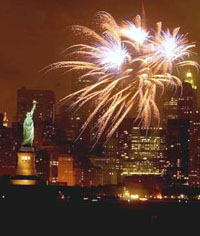|
|
|
 |
|
|
American Holidays > Independence Day (July 4) |
|
Independence Day is regarded as the birthday of the United States as a free and independent nation. Most Americans simply call it the "Fourth of July," on which date it always falls. The holiday recalls the signing of the Declaration of Independence on July 4, 1776. At that time, the people of the 13 British colonies located along the eastern coast of what is now the United States were involved in a war over what they considered unjust treatment by the king and parliament in Britain. The war began in 1775. As the war continued, the colonists realized that they were fighting not just for better treatment; they were fighting for freedom from England's rule. The Declaration of Independence, signed by leaders from the colonies, stated this clearly, and for the first time in an official document the colonies were referred to as the United States of America. It is a day of picnics and patriotic parades, a night of concerts and fireworks. The flying of the American flag (which also occurs on Memorial Day and other holidays) is widespread. On July 4, 1976, the 200th anniversary of the Declaration of Independence was marked by grand festivals across the nation. see
also: |
||
| Feature Articles | ||
U.S.
Independence Day a Civic and Social Event Celebrating
the Fourth of July |
||
| Texts
are abridged from U.S. State Department
IIP publications and other U.S. government materials. |
||
DISCLAIMER
Any reference obtained from this server to a specific commercial product, process, or service does not constitute or imply an endorsement by the United States Government of the product, process, or service, or its producer or provider. The views and opinions expressed in any referenced document do not necessarily state or reflect those of the United States Government. |
 U.S. Diplomatic Mission to Germany /Public Affairs/ Information Resource Centers Updated: September 2010 |

